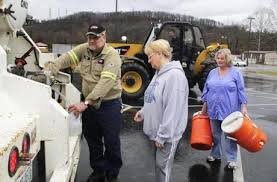By Doug Struck
Globe Correspondent
If anything could puncture the myth of overregulation, it should have been the plight last week of a third-of-a-million thirsty West Virginians. The Jan. 9 spill from a plant that sells chemicals for coal processing poisoned the water supply near Charleston and exposed the lie that the government is vigilant about public safety.
Bostonians got a small taste of life without clean water in 2010, when a major pipe burstand residents in the metro area were advised to boil water for three days. In West Virginia, people were told not to even touch it—not to bathe, cook or clean with it, let alone drink it— for nine days while getting precious little information from safety regulators.
 It turned out the tank that leaked had not been inspected since 1991. The Charleston Gazette, led by a renowned environmental reporter, Ken Ward Jr., was all over the story. But each time they turned to the federal or state agencies responsible for oversight of the plant—the state environmental agency, the EPA that enforces the Clean Water Act and other federal laws, and Centers for Disease Control, called in for help with chemical safety standards—they were met with silence. The officials had nothing to say about the matter and had little advice for the residents—more than 400 of whom were sickened and hospitalized.
It turned out the tank that leaked had not been inspected since 1991. The Charleston Gazette, led by a renowned environmental reporter, Ken Ward Jr., was all over the story. But each time they turned to the federal or state agencies responsible for oversight of the plant—the state environmental agency, the EPA that enforces the Clean Water Act and other federal laws, and Centers for Disease Control, called in for help with chemical safety standards—they were met with silence. The officials had nothing to say about the matter and had little advice for the residents—more than 400 of whom were sickened and hospitalized.
When state regulators and the CDC finally said last Friday they had determined the water was safe to drink, reporters asked how they calculated that. The chemical, MCHM, isn’t even regulated by the federal government; there are no set safety standards. The CDC said it had looked at an unpublished 1990 study of rat deaths from the chemical, but would not explain how that study led to conclusions for humans.
Frustrated by six days of silence, Gazette reporter David Gutman tracked down the chief of the CDC at his home, but the official, Tom Frieden, would not even talk about the emergency. In a world of true public accountability, that dereliction of duty should have led to a humiliated resignation or prompt dismissal.
But we are not in such a world. Forty-four years ago, as Peter Dykstra of the Environmental Health News pointed out this week, the president of the United States declared that “restoring nature to its natural state is a cause beyond party and beyond factions. It has become a common cause of all of the people of this country.” That was a Republican, Richard M. Nixon, who created the EPA, signed into law the Clean Air Act, and—when he got cold feet and vetoed the Clean Water Act—was overridden by a Congress of united Republicans and Democrats.
Today, virtually any move to protect the environment or environmental public safety sets off a howling protest in Congress that evil bureaucracy is throttling beleaguered business. The EPA has become a punching bag, assailed by Republicans at every turn, and under constant siege by lawmakers who want to throw open the door to unrestrained business. In West Virginia, long beholden to coal companies and suspicious of government, pressures on local regulators must be even greater. One day before the spill, W. Va. Gov. Earl Ray Tomblin was railing against the EPA’s “misguided policies on coal.” The next day, he was asking for federal help to clean up the emergency.
Why should the public trust business with their health and safety? Business owners have no responsibility to protect the public —their legal fiduciary responsibility is to get as much profits as possible, regardless of public good. Freedom Industries, which owns the plant and was founded by a two-time felon, proved that: the company promptly went bankrupt to try to sidestep fines, liability lawsuits, and a bill for $2.4 million in unpaid taxes.
The cry of overregulation is simply overblown. The Toxic Substances Control Act, the 1976 law that is supposed to protect us from dangerous chemicals, is hopelessly overwhelmed by today’s burgeoning chemical use. It covers only a relative handful of the thousands of chemicals being used today.
And when health, safety and environmental regulations are imposed, businesses typically benefit: they upgrade, modernize, become more efficient and more profitable.
One would have expected the events in West Virginia to generate a swell of protests, and demands for more and better regulation. There were a few such outcries, but mostly the events were greeted by the same response as that from regulators: the sound of silence.
(photo: Bostonglobe.com)